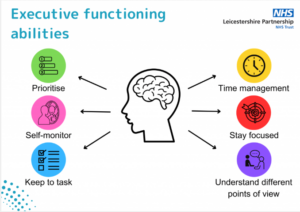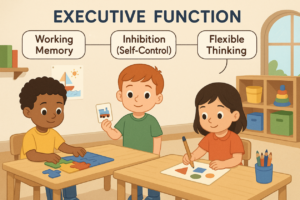Executive Function
 Executive functioning refers to a set of cognitive processes that enable us to plan, organise, problem-solve, remember information, follow instructions, regulate emotions, and stay focused despite distractions. Sometimes called the brain’s “air traffic control system,” it plays a key role in reasoning, multitasking, and self-regulation.
Executive functioning refers to a set of cognitive processes that enable us to plan, organise, problem-solve, remember information, follow instructions, regulate emotions, and stay focused despite distractions. Sometimes called the brain’s “air traffic control system,” it plays a key role in reasoning, multitasking, and self-regulation.
“Executive Functions provide essential tools that support learners to access optimal learning. They act as a mechanism that accurately and consistently guides the cognitive processes towards the intended outcome. Cognitive skills involve the processing of information, which is enhanced when combined with good executive functions. In the absence of developed executive function skills, learning is not as effective or as consistent.” Education Scotland
While children who are neurodivergent—particularly those with ADHD—may face challenges with executive functioning, these skills are crucial for all children. Development begins early, with the most rapid growth occurring between ages 3 and 5. In neurotypical individuals, executive functions continue to develop into the mid-20s and may fluctuate during adolescence, contributing to variability in emotional regulation and focus.
For neurodivergent individuals, the development of executive functioning is often delayed, and difficulties may persist throughout life. But any child can face challenges with executive functioning. These challenges typically originate in the frontal lobe and are especially affected by three core areas:
- Working memory
- Inhibition (self-control)
- Flexible thinking
These core skills influence other aspects of executive functioning and impact daily life in ways often overlooked. Tasks that may seem routine can be significantly more difficult or exhausting for individuals with underdeveloped executive functioning.

Build positive relationships with children, get to know their strengths and what helps them when they find things challenging.
Consistent daily routines help children understand expectations and reduce anxiety, allowing them to focus on developing their executive functioning skills.
Visual timetables and cues can further support this structure, visual time tables are useful for all children. Some children may also benefit from the use of now and next cards.
Providing visual instructions, as well as verbal ones, can be really helpful for children. verbal instructions alone can be easily forgotten. Modelling tasks can also be really helpful, or having an example of what the finished task should look like.
Avoid giving too many instructions at once. Break larger tasks down into smaller steps.
Repetition helps support children to have their learning go to long term memory. repeat new learning as often and in as many ways as possible. Children may also need instructions to be repeated, this does not mean that they weren’t listening.
Timers to support transition from one task to another.
Adapt the learner’s environment to make it less arousing e.g. low lighting, less clutter, quiet spaces.
Play games which promote turn-taking and patience.
Allow children regular opportunities to move, if a child is fidgety during focused times, they need more movement rather than being told to sit still. Consider introducing fidget toys or movement cushions for listening times.
Actively teach children about emotions and strategies which can support their emotional regulation. For example using Zones of regulation or self regulation techniques.
Always use concrete objects to support the learning of abstract concepts, for example cubes, Numicon and cuisenaire rods for maths.
Teach children about unexpected changes – e.g. social stories around fire alarms, going home when you don’t feel well.

